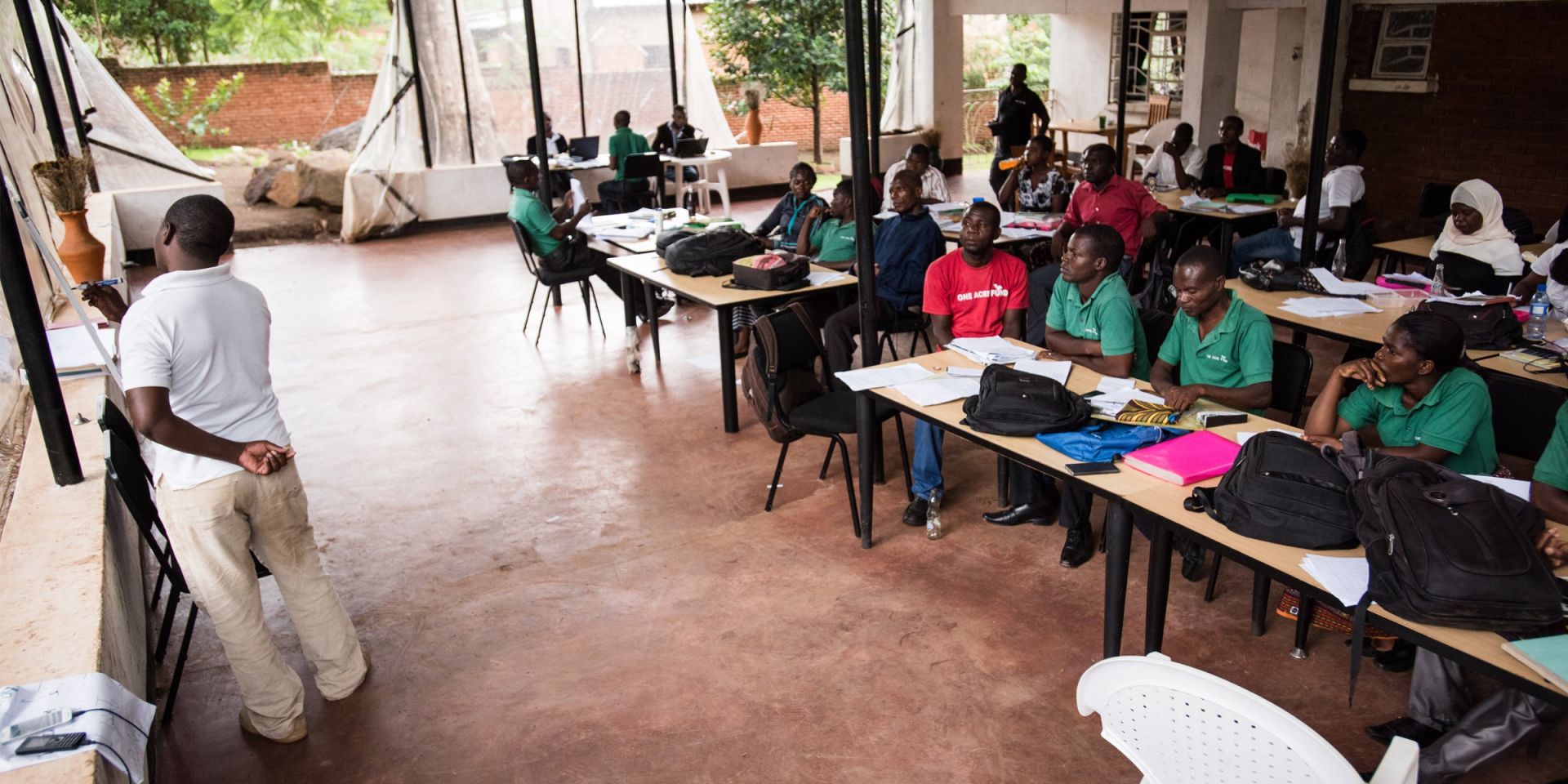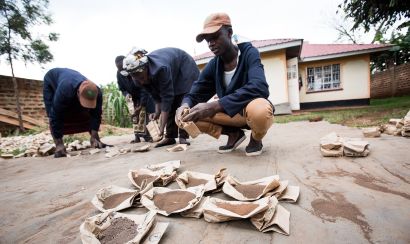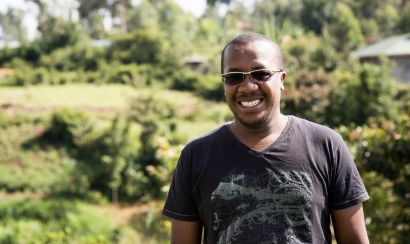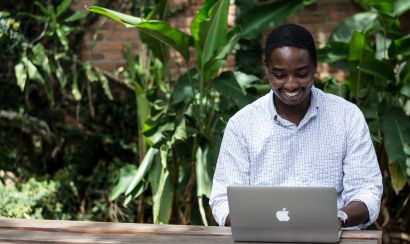How coaching is helping our teams better adapt to a changing business landscape
As with other organizations, the past two years have been characterized by constant change — including a pandemic and new workplace trends — increasing the need for adaptability among employees and organizations. And, as our work and programs change in response, our teams are changing and growing, creating opportunities for our constantly morphing roles. To ready our team to steer our organization and work into the future, One Acre Fund has been running a coaching program that links staff with external experts to hone their skills or develop additional ones.
Coaching is a proven performance and management technique and is key to One Acre Fund’s leader development approach that enables staff to achieve their full potential. In this piece, Stephanie Hanson, One Acre Fund’s Senior Vice President for Policy and Partnerships, and Nyamongo Motaroki, One Acre Fund’s lead writer and editor, share their experiences with coaching, and why it is a valuable investment for organizations and employees alike.
“The coaching experience was enlightening as it gave me a new perspective on how to approach challenges. The most exciting bit was learning that 90% of the time, I usually have the solutions to challenges — all I need to do is take a breather, declutter my mind, and approach situations more objectively. Coaching has also enabled me to become an active listener and lead my team collaboratively,” — Alice Musetti, External Relations Manager [Tanzania]
Why are you passionate about coaching as part of staff development?
Stephanie: A few years ago, I was having challenges in my work — my teams were growing, and I needed to learn a different way of leadership, specifically effective delegation. I was fortunate enough to work with an external coach through this challenge. It was a terrific decision as coaching transformed how I worked and thought about myself as a leader; that experience sparked an interest in me for coaching. I am passionate about making this opportunity available to staff at One Acre Fund, as I believe this will help accelerate our growth as an organization. We grow more sustainably when we develop and grow our team to take on more responsibility and ownership within the organization. Coaching is a fantastic tool for supporting the growth of leaders.

Stephanie Hanson, Senior Vice President for Policy and Partnerships
Why did you decide to participate in the coaching program?
Nyamongo: My manager has always steered me towards upskilling and training in response to gaps that manifest in my work and as part of the organization’s focus on consciously developing leadership skills amongst staff. The coaching program was a resource that became available when I needed to upskill when I became a manager. It was also free for me, and I could easily make time for it.
“I took part in the coaching program when I first became a manager. Coaching helped me think outside the box and gave me new ideas. The biggest impact came from having dedicated sessions with my coach where we tackled managerial challenges. The coach would often ask questions and let me think through the issues I was facing. These sessions helped me to build confidence in myself and find solutions that made the most sense for me in my situation. Having an outside perspective has helped me form a vision for my future and start planning how to get there. Coaching has helped me get from feeling confused about my role to being motivated and developing an understanding of what I need to do to be an effective leader,” — Josh Jabour, Software Engineering Manager [Rwanda]
How do staff apply to join the program?
Stephanie: The application window is always open, and staff can apply anytime. We shortlist applicants depending on their contribution to their team and the organization. We look for driven, motivated individuals who can remain committed to the coaching program. We later link successful applicants to our network of coaches, and staff can work with the internal or external coaches for about six months. Coaching focuses on developing leadership and soft skills, such as leading teams, building relationships, or thinking strategically. During the program, staffers aim to achieve one or two goals geared towards increasing the impact of their work and becoming stronger leaders.
Please tell us about your experience with the program.
Nyamongo: I was pleasantly surprised that the coach was not an authoritative figure during the coaching engagements. I learned that it is my journey and space, and the coach is a facilitator; I am the expert in my own experience, and all the answers I need are within my reach. The coaching engagements made me more aware of my goals — my coach and I developed a vision of how we could improve my approach and way of thinking. Creating rapport and honesty is important — effective coaching takes place in an atmosphere of openness and honesty, allowing for open conversations and feedback.
“The coaching program has helped me improve my ability to think strategically and integrate my day-to-day tasks into organizational objectives. Additionally, I have developed a practical delegation framework for my team, and this has helped in promoting high productivity, efficiency and boosting team morale,” — Getinet Nega, Partnerships Associate and Government Relations Lead [Ethiopia]
Are there any advantages that come from going through the program?
Stephanie: Individuals who remain committed and motivated get the most out of coaching engagements. I have seen coaching transform quite a few leaders within One Acre Fund — helping them understand and work on internal barriers that limited them. Leadership comes with challenges, and we aim to help our leaders learn how to navigate any amount of complexity and change — things that are usually not taught in school.
Nyamongo: I am more self-aware — about what I want out of my career. Coaching helped me examine my life and career, identify beliefs that may have been limiting me, and to replace those with confidence in myself.

Nyamongo Motaroki, One Acre Fund’s Lead Writer and Editor
How did coaching change you?
Nyamongo: I have learned new worldviews that help me assess my skills and experience. As a result, I can look at team goals with a broader scope, enabling me to develop better goals for myself and my report. By gaining outside perspectives, I can now reflect on new concepts — such as how my goals support the organization’s values and how to implement those in my daily work. I have also developed transferable skills, such as conflict management, problem-solving, and creating a coachable development mindset, which I can pass along to my report. Gaining skills like these allows me to be a better team member, which is a definite plus for productivity and overall collaboration.
Stephanie: To be honest, I have seen a lot of people get promoted after completing their coaching engagement — this is a testament to their growth and ability to take on more responsibility and scope. One staff member exceeded her business targets and credited it to the strategic thinking skills she gained from her coaching engagements. Other staffers have increased their confidence in their ability to succeed as leaders.
“Coaching played a significant role in launching me into leadership. I started the engagements when shifting from a single direct report to managing a team. Leadership took more effort than I expected — I wanted people to like me, and giving feedback felt scary. My coach challenged me to find and understand the root cause and correct it. Additionally, coaching boosted my confidence — I began seeing myself as more of a leader rather than a strong performer. This confidence has enabled me to open more doors for myself,” — Marika West, Chief of Staff, Technology Division
How can one get the most out of coaching engagements?
Stephanie: You will get the most benefit from working with a coach if there is a particular development area that you want to work on, either working through a career challenge or transitioning into a new role. It can be difficult to go through a growth phase on your own, and even with the support of a good manager, some decisions can be hard to make. A coach will challenge you, help you navigate development areas, and help you see things in new ways to become a strategic thinker and a stronger version of yourself.
Whether one is looking to learn a new skill or improve their performance, coaching can help. Similar to any business or personal goal, developing a personalized and customized game plan and commitment is critical to success. Coaching is about the future — it will help you think ahead, navigate challenges, learn, grow and become a better leader and professional.




